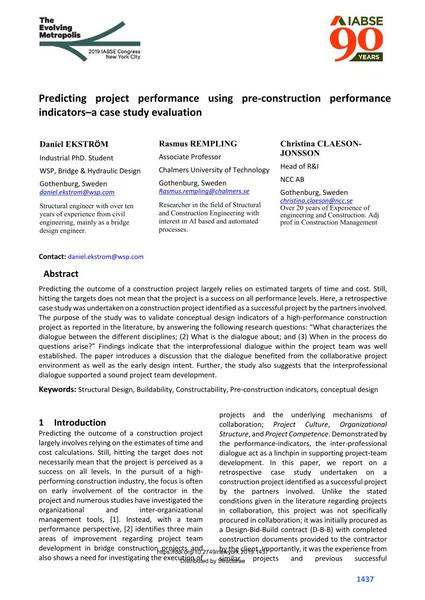Predicting project performance using pre-construction performance indicators–a case study evaluation

|
|
|||||||||||
Détails bibliographiques
| Auteur(s): |
Daniel Ekström
(WSP, Bridge & Hydraulic Design)
Rasmus Rempling Christina Claeson-Jonsson (NCC AB) |
||||
|---|---|---|---|---|---|
| Médium: | papier de conférence | ||||
| Langue(s): | anglais | ||||
| Conférence: | IABSE Congress: The Evolving Metropolis, New York, NY, USA, 4-6 September 2019 | ||||
| Publié dans: | The Evolving Metropolis | ||||
|
|||||
| Page(s): | 1437-1442 | ||||
| Nombre total de pages (du PDF): | 6 | ||||
| DOI: | 10.2749/newyork.2019.1437 | ||||
| Abstrait: |
Predicting the outcome of a construction project largely relies on estimated targets of time and cost. Still, hitting the targets does not mean that the project is a success on all performance levels. Here, a retrospective case study was undertaken on a construction project identified as a successful project by the partners involved. The purpose of the study was to validate conceptual design indicators of a high-performance construction project as reported in the literature, by answering the following research questions: “What characterizes the dialogue between the different disciplines; (2) What is the dialogue about; and (3) When in the process do questions arise?” Findings indicate that the interprofessional dialogue within the project team was well established. The paper introduces a discussion that the dialogue benefited from the collaborative project environment as well as the early design intent. Further, the study also suggests that the interprofessional dialogue supported a sound project team development. |
||||
